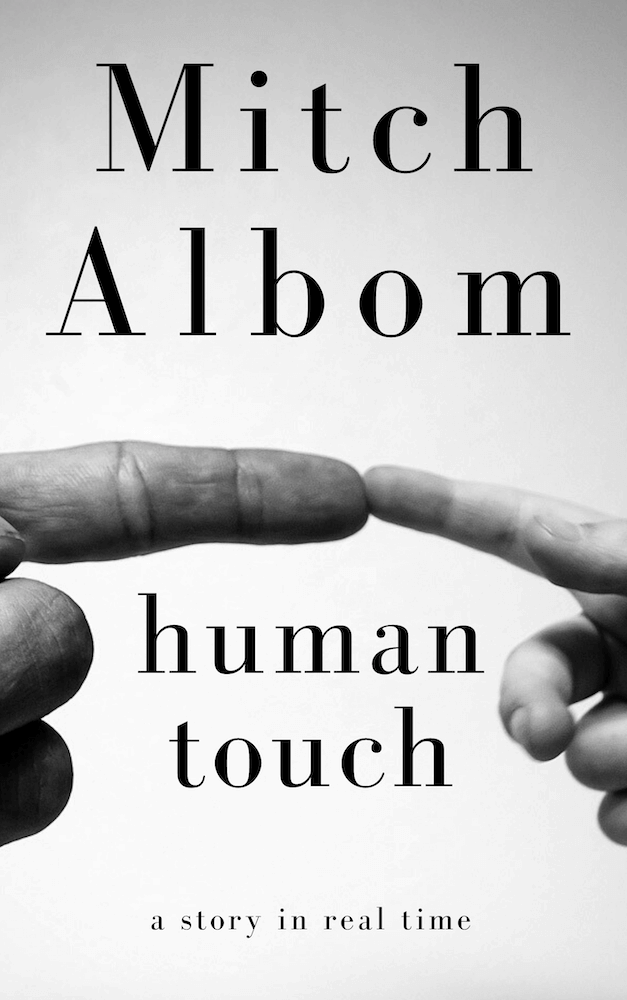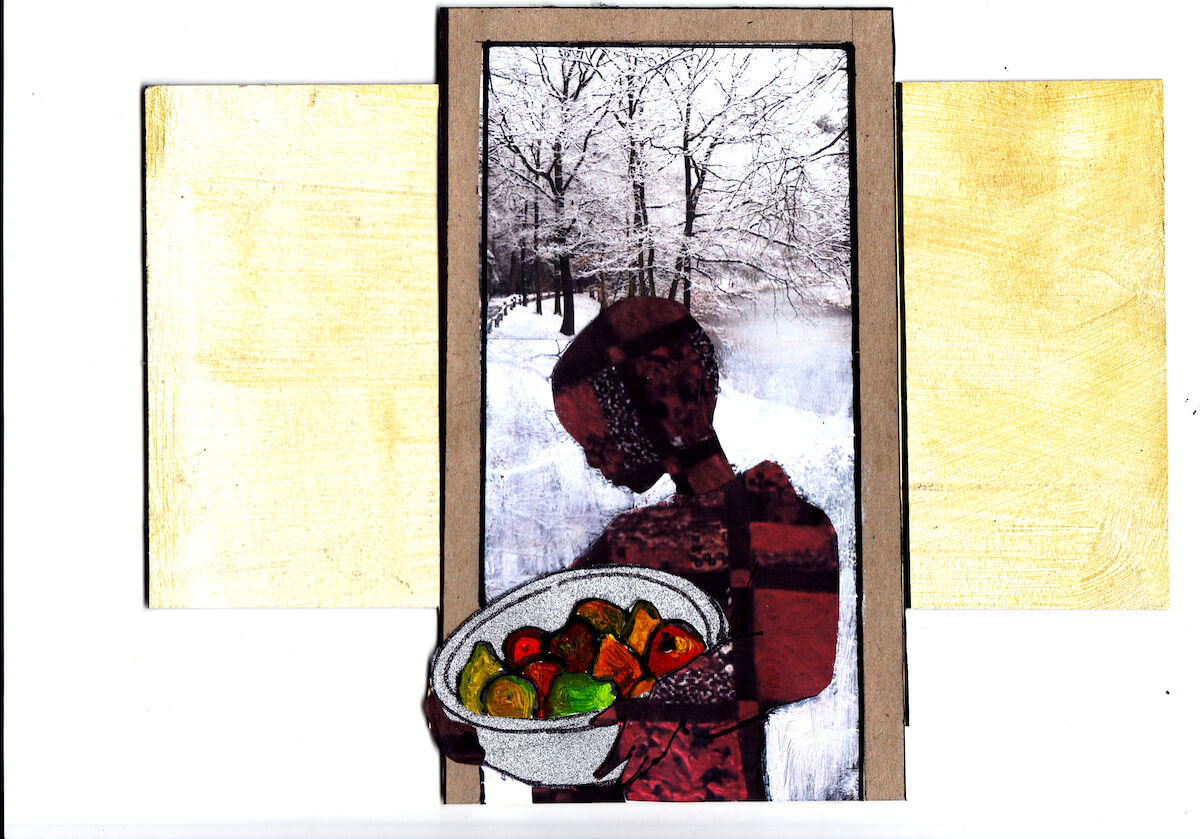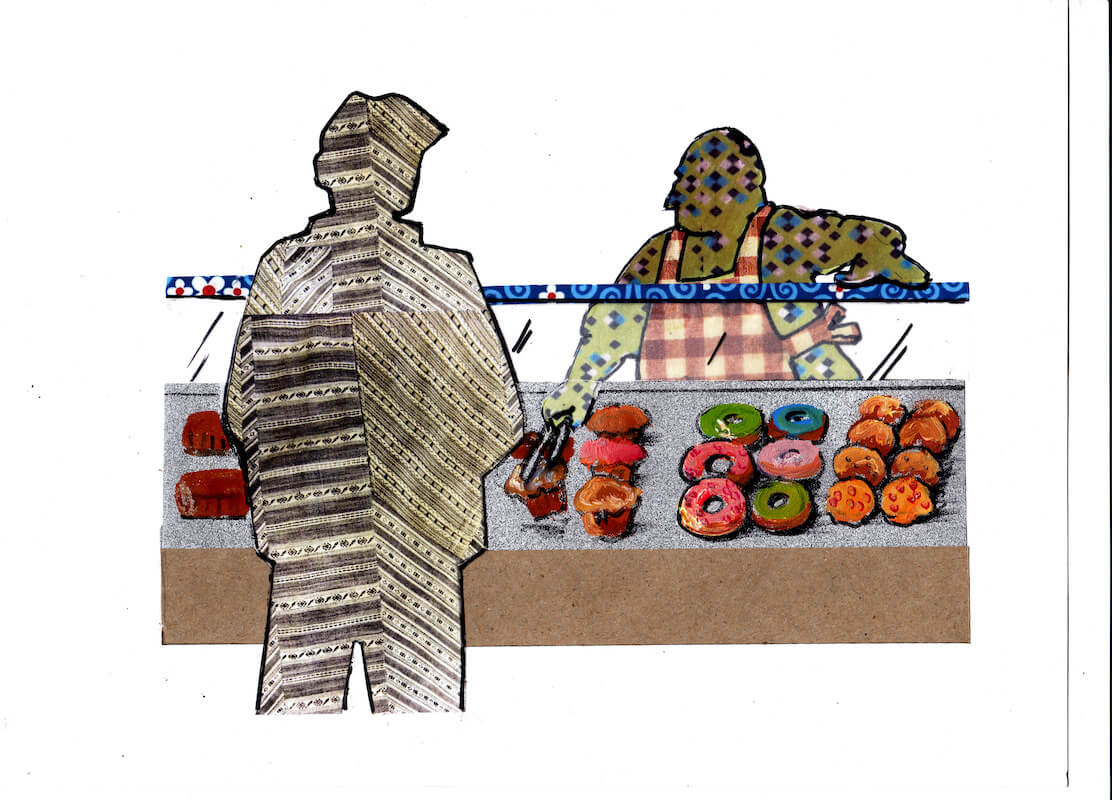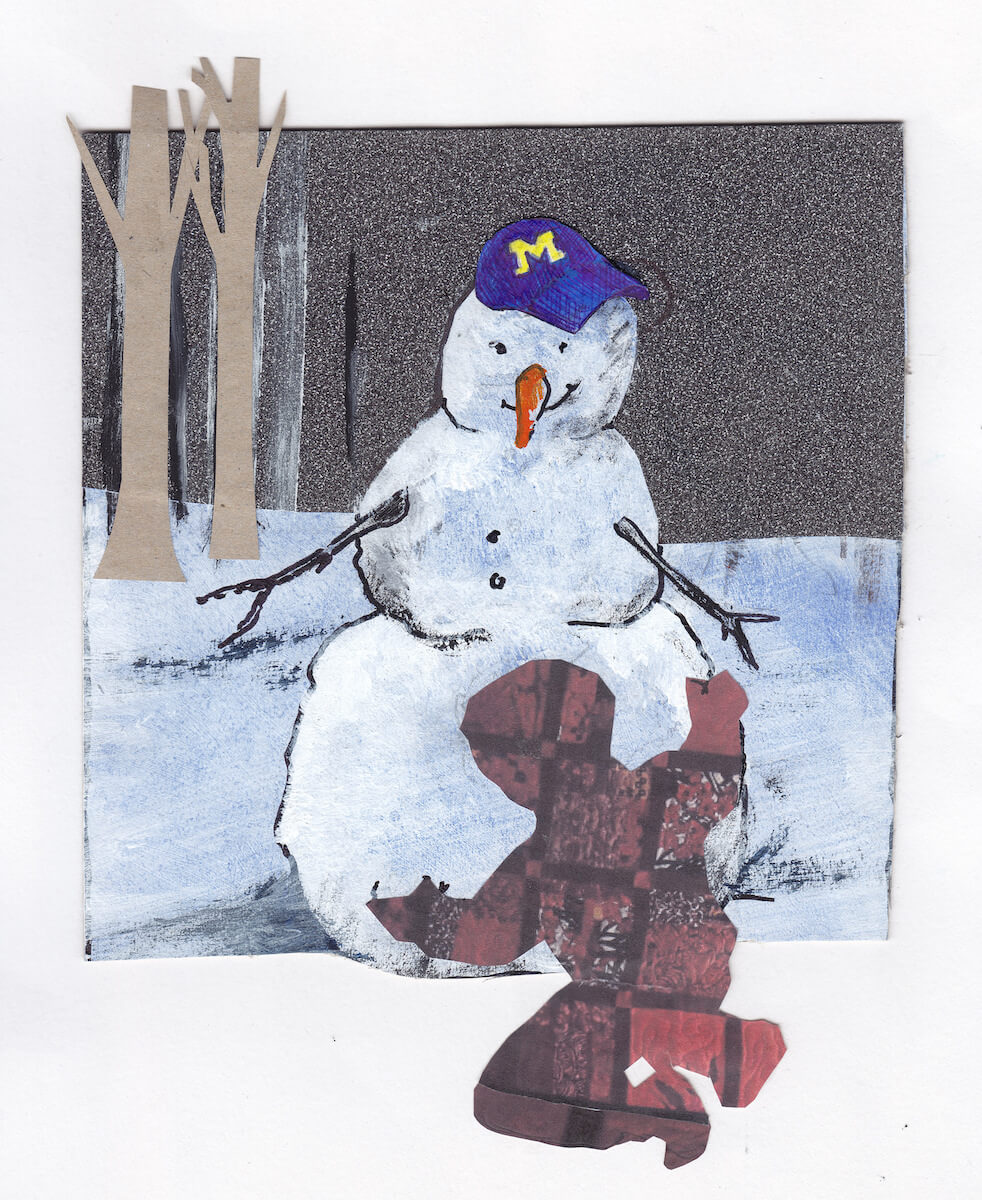← Series
Next →
“The spirit of man can endure only so much. And when it is broken, only a miracle can mend it.”
—John Burroughs, American essayist
Prologue
Sometime in the future…
A little boy taps on a small basement window.
“It’s open,” an old woman says.
She sits up on the mattress. An electric teapot is plugged in nearby, and a plate of half-eaten oatmeal rests on a tray.
The little boy pushes his way through the window – only someone as small as he is could fit – and drops to the floor, his sneakers making a thwock on the basement concrete.
“Are you sure this is OK, Little Moses?” the old woman asks. “I don’t want you to get in trouble.”
“No one saw me, Miss.”
“I don’t want to get you sick.”
The boy stomps his sneaker to lose some dirt.
“I cannot get sick, Miss.”
“Are you sure?”
“Yes, Miss. Don’t worry, Miss.”
A single tear falls down her cheek. She lifts her arms and the boy approaches. He pushes off his shoes as she makes room for him in the bed. Beneath her loose grey hair, which reaches her shoulders, he sees a small locket around her neck. He lays his head against her chest, wondering what is inside the locket.
“Thank you, Little Moses,” she whispers. “Thank you for letting me hold you.”
She coughs several times. The boy feels the old woman’s arms tighten around him, savoring the comfort of a simple human touch.
“You are welcome, Miss,” he whispers.
Week One
Months earlier…
Little Moses is running as fast as his short legs will take him, his arms churning, his mouth gulping oxygen. Two older boys give chase.
“We’re gaining on you!” one yells.
“No!” Moses screams.
“If we touch you, it’s over!”
Moses knows them. Daniel and Buck. The teenage brothers who live across the street. They are drawing closer, crunching dead leaves beneath their boots.
“Don’t let them get you, Moses!”
It is Ava’s voice. Ava, his friend. He looks left and sees her running, too.
“Ava!” he yells.
“You’re both dead!” Buck hollers.
Moses turns and nearly collides with a tree. He swings his arm around it, spinning and slipping on the rocks, which are wet with snow.
Down he goes.
“No, Moses!” Ava yells. “Get up!”
His legs sting. His lungs burn. He wipes a leaf from his face. Too late. The older boys are standing over him.
“Don’t! Don’t!” Moses screams, shielding his face with his gloves. Their hands are bare and red. They lean in, fingers stretched open.
“Gotcha,” Buck says. “Now you are…”
“BOYS! COME IN! WE’RE EATING!”
“It!” he finishes, tagging Moses.
“No, I’m not!” Moses protests.
“Yes, you are.”
“No, I’m not! The game is over if a mother calls.”
“He’s right,” Ava says, wandering in. “Those are the rules.”
Buck looks at Daniel, who shrugs.
“Whatever,” he says.
ON A CORNER of a town in a country of our time, four families live across the street from one another, near a patch of woods where the children are playing tag. If you were a bird and flew over this corner, you would see their homes spaced out neatly, the skylights atop a large contemporary, the modest shingles of an older colonial, the dual chimneys of a converted farmhouse, and the irregularly shaped rooftop of a 1940’s cider mill.
If you flew lower, you would see the inhabitants physically interacting, shaking hands, giving hugs, throwing snowballs.
Four families.
One corner.
North, south, east, west.
At this moment, in the week before the world changed forever, three of those families are converging on the home of the fourth, which belongs to Dr. Greg Myers and his wife Aimee, who bought their property seven years ago, tore down a small ranch, and built what neighbors call a “McMansion.”
Here comes the Lee family, Sam and Cindy, a successful young couple who work in the computer field, followed by their housekeeper, Rosebaby, who is Moses’s mother. Moses – whom everyone calls “Little Moses” because of his size – runs up beside her. She wipes mud from his face.
“You are all dirty,” she whispers.
Behind them is the local pastor, Winston Towns, wearing a brown bomber jacket, followed by his wife, Lilly, holding hands with their three kids, who all wear parkas with their hoods pulled up, one of them carrying a Super Soaker water gun.
Lastly, walking slowly, comes Old Man Ricketts, owner of the mill, wearing a long overcoat and holding a jar of apple cider. Next to him is his wife Charlene, whose white hair is teased out in a bun. Daniel and Buck – the two boys who had been chasing Little Moses – are the Ricketts’ teenaged grandsons. They fall in behind.
The door of the McMansion swings open.
“You all got here at the same time!” Greg bellows.
“Happy Saturday!” says Aimee.
The hosts are embraced as the guests walk in. Everyone gets a hug or a kiss.
“We brought some fruit,” says Cindy, nodding to Rosebaby, who is holding a silver bowl of apples and pears.
“I can carry it!” Little Moses offers.
Greg smiles. “How old are you now, Little Moses?”
“Eight.”
“Well, that’s old enough, I guess.”
Little Moses takes the bowl from his mother and steadies his arms beneath it.
“He likes to help,” Rosebaby says.
Rosebaby is Haitian, and has worked for the Lees since arriving in this country three years ago. Moses joined her last year, after his paperwork cleared.
“OK, everyone, hang your coats,” Aimee announces. “I’ve got two big bowls of chili – meat and vegan – cornbread, salad and brownies.”
Old Man Ricketts, the last one in, closes the door behind him.
Everyone is safe inside. North, south, east, west.
It is Saturday. Early February. Winter.
“Did anyone hear about this virus?” Lilly asks.
Week Two
A dusting of snow is covering the corner. Sam Lee enters the cider mill and wipes flurries from his coat sleeve. He picks up two apple pies and examines the muffins. The Ricketts Family Mill, the third largest in Michigan, sells pies, donuts, cakes, and lots of cider. Although apple season is over now, Old Man Ricketts keeps the place running year-round. He steps to the counter, wearing a long apron, which is stained.
“How you doin’, Mr. Ricketts?” Sam says.
“Good. You?”
“I’m good. Can I get a blueberry muffin?”
Ricketts uses tongs to pick it up.
“What do you know about this China thing?” he says.
“You mean the virus?”
“Uh-huh.”
“Just what I read.”
“They got some in America now.”
“I read that. Seattle?”
“Yeah. Someone flew in from China.”
“I guess that’s how it spreads.”
“What’s that place like? ‘Wuhan,’ is it?”
Sam looks up.
“Mr. Ricketts, I’m not from China.”
“I heard they eat bats and snakes.”
“Like I said, I’m not from there.”
Ricketts raises an eyebrow.
“You’re Chinese, aren’t you?”
“My parents came to America in the 50’s. I was born in Flint.” He forces a smile. “Flint’s a long way from China, right?”
Ricketts makes a grunting sound.
“Gonna eat this now or later?” he asks.
“Now,” Sam says.
Ricketts hands him the muffin with the tongs.
“There you go.”
GREG MYERS pulls his BMW into the driveway and waves at his daughters, Ava, 15, and Mia, 9, who are building a snowman with Little Moses. Greg sees his blue Michigan cap atop the snowman’s head. He sighs. There goes that hat.
“Better come inside, girls, it’s getting dark,” he says, lowering the window. “Little Moses, you go on home, OK?”
Mia wipes her nose on her jacket sleeve. Ava rubs some snow on Moses’s cheek.
“I said now, girls.”
The children scramble.
Later, at the dinner table, Aimee serves green beans to her daughters. Mia picks one up and lowers it into her mouth, as if swallowing a worm.
“The invitations went out today,” Aimee says.
Greg nods while chewing. “OK.”
“I still don’t get why you guys are getting married again,” Ava says, twirling her pasta. “Isn’t once enough?”
“We’re not getting married again,” Aimee says. “It’s a renewal of our vows.”
“What does that mean?” Mia asks.
“It means,” Greg says, “after 20 years, we want to tell the world how much we still love each other.”
He takes his wife’s hand and smiles mischievously.
“Gross,” Ava says.
“Ewww,” Mia says.
“Do I have to get a new dress?” Ava asks.
“We’ll see,” Aimee says. “You have a lot of nice things you never wear.”
“Because they suck,” Ava says.
“Ava!” Greg says.
“Sorry,” she mumbles.
Aimee takes a piece of garlic bread. “Anything new at work today?” she asks Greg.
“We had a briefing on this virus from China.”
“Do they expect cases here? In Michigan?”
“They just went over protocol. It’s the same routine as the flu, basically.”
“So this is a flu?”
Greg takes a sip from a blue Gatorade bottle.
“I don’t know what it is,” he says.
Ava rises. “I’m finished.”
“You are not finished,” Aimee says, “or there wouldn’t still be salmon on your plate.”
“I ate as much as I can. It’s fish.”
“It’s good for you.”
“Dad’s drinking Gatorade!”
Greg swallows. “It’s good for you.”
Aimee lowers her voice. “It’s so full of sugar.”
“See!” Ava says.
“I think she heard you,” Greg says, grinning.
PASTOR WINSTON reads aloud from the pulpit, a passage from the New Testament:
“The day of the Lord will come like a thief. And then the heavens will pass with a roar, and the elements will be burned and dissolved, and the earth and its works will be exposed.”
He looks out at a sea of faces.
“Didn’t mean to scare you,” he says.
The congregation laughs politely. Most of the pews are filled. Pastor Winston smiles. He knows he shouldn’t measure faith by attendance, but he feels immensely satisfied.
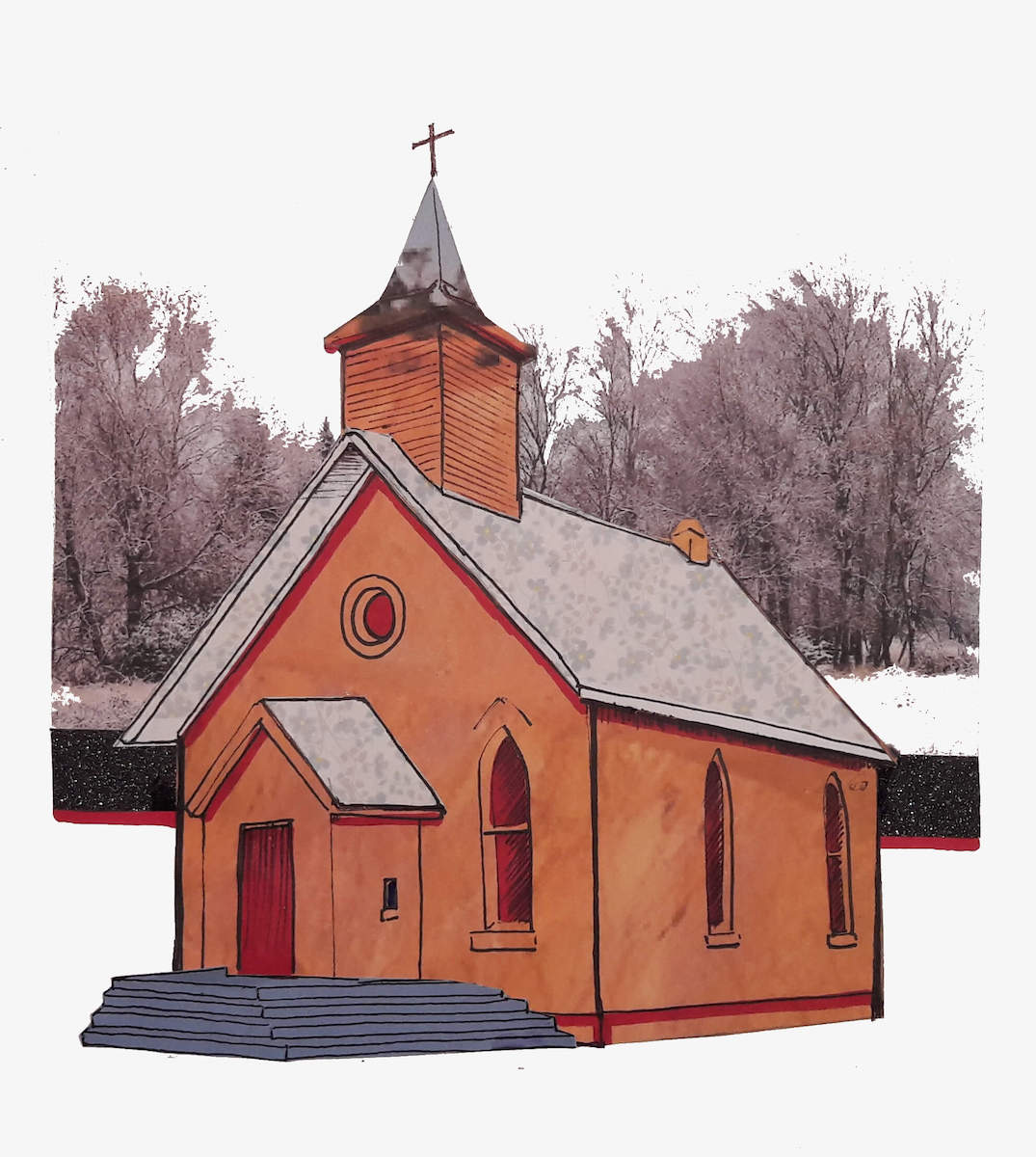
“This passage,” he says, holding up his Bible, “came in response to people asking Paul, ‘When is Jesus coming back? Is he ever coming back?’ Maybe they’re only planning on being good once they know of his return.
“So Paul tells them when Jesus does come back, there will be no warning. He’ll arrive like a thief. And we will all be judged.’’
Winston sees a hand go up. It’s Rosebaby, the Haitian woman who lives with the Lee family. Her young son, Little Moses, is beside her, as usual.
“Yes, Rosebaby?”
“Why would the Good Book compare the Lord to a thief?”
A few people chuckle softly.
“Well,” Winston says, “it’s just a metaphor. To remind us we never know what is coming.”
Rosebaby looks away, then folds her hands in her lap.
“I knew this already,” she says.
Pastor Winston grins.
“Any other questions?” he asks.
Week Three
Greg finishes examining a patient, an older Lebanese man in his 70’s.
“We’ll do another scan in six months,” Greg says. “But I think we’re out of the woods.”
“Thank God,” the man says, shaking Greg’s hand, then suddenly embracing him.
“Whoa, OK,” Greg says, a bit embarrassed.
Greg has been a pulmonologist for 21 years. He sees a good deal of emphysema, bronchitis and lung cancer, from which the Lebanese man has seemingly recovered. Greg takes a moment after the man leaves to think about something an old mentor told him during his residency.
“Patients will expect you to be God. You will learn you are not. The challenge is keeping that to yourself.”
Greg walks the file down to the front desk. His colleague, Jerry, pulls him aside.
“Did you hear?”
“What?” Greg says.
“We got our first case. Covid-19. Woman.”
“Where?”
“ICU.”
“Already?”
“She came in on her own, to ER. Six hours later, her lungs are full of fluid, and they’re calling for a vent.”
“Holy crap.”
“Another flu.” Jerry shakes his head. “Like hell it is.”
NORTH, EAST, SOUTH AND WEST are gathered once more on another Saturday afternoon, this time inside the remodeled farmhouse owned by Cindy and Sam Lee. It’s a modern open floor plan design, with high ceilings and two massive skylights, and the Lees have used a long, oak table to spread out a dessert buffet: ice cream containers with silver scoopers, two chocolate mousse cakes, oatmeal cookies and ten banana muffins.
“All right,” Cindy announces, putting down a tray of grapes. “We’re open for business.”
The kids rush in, bumping their bodies and playfully swatting each other’s fingers from the sweets. Rosebaby has arranged the oatmeal cookies in a circle, one overlapping the next.
“Please don’t grab every cookie,” Lilly scolds, as her kids pick through them. “I’m serious. Just take one.”
Aimee watches nervously. She sees how many times the kids touch each other or something another child has touched – cookies, toys, crayons – and how fast they put their fingers in their mouths or their eyes. She thinks about this new flu and how fast it will shoot through the school. She reconciles herself: My kids are gonna get it.
The four families have been gathering every Saturday for years, partly because their kids all play together, and partly because it eases the burden of finding other weekend activities. They rotate houses to share the expenses.
The conversation today is focused on the virus. As the kids squirt Hershey’s chocolate sauce, the adults are clipping each other’s sentences.
“My sister had to cancel her cruise–”
“Do they get their money back?–”
“Wait, how about this? We had tickets to the game Thursday – I just read they’re cancelling it.”
“How dangerous can a basketball game be–’
“It’s not the game-“
“It’s the crowds. What if someone has the bug—”
“Exactly—”
“And they spread it to someone in their row, who spreads it—”
“Oh, come on.”
“Did you hear they might close some schools?”
“Oh, my God. If I’m stuck at home with the kids, I’ll lock myself in the basement!”
Laughter.
“I don’t get it. Isn’t this just for old people?”
“No, no. It’s old people who die from it—”
“Shhh. Lilly, the kids—”
“I’m sorry. But that’s what they say—”
“Speaking of the kids, did yours get flu shots this year?’
“Ours did.”
“I read an article about how many people die from flu every year. It’s something like 60,000—”
“I saw that, too—”
“All those people die and nobody says squat.”
“And meanwhile, this new thing, they have, what, two cases in the whole state?”
“And they’re cancelling the basketball?
“It’s an overreaction.”
Aimee has been listening quietly. “It’s not an overreaction,” she blurts out. “Greg, tell them what happened in China.”
Everyone turns to Greg.
“That’s China, honey. Doesn’t mean it’s gonna happen here.”
“What happened, Greg?”
“A lot of people are dying. Apparently, they closed off an entire city trying to contain it.”
“Sam? What are you hearing?”
Sam blinks in disbelief. “Are you serious? Jesus. I went through this with Ricketts.”
Now everyone looks at Ricketts.
“I just asked Sam what he knew,” Ricketts says, “because, you know…”
“Because he thinks I’m Chinese,” Sam says. “So I’ll tell you what I told him. I was born in Flint. I know as much about China as you do. Jesus.”
“Sam,” Cindy says softly, touching his arm, “that’s not totally true. I mean, we still do have some family—”
“You have family.”
Cindy shoots him a look. “Anyhow, it’s not like China invented this so that Americans could get it.”
Ricketts snaps a piece of oatmeal cookie.
“That’s one theory,” he says.
“Pete, don’t be an asshole,” his wife Charlene snaps.
Eyes shoot back and forth.
“Well, let’s hope the two people in our state get better,” Lilly says, “and then we’re done with this.”
“Amen to that,” Pastor Winston adds.
“Rosebaby,” Lilly says. “What about Little Moses? Has he had flu shots?”
“Little Moses cannot catch anything,” she says.
The others share a concerned look.
“Rosebaby,” Greg says, softly, “everybody can catch something.”
“Not him,” she says, smiling.
Greg hooks his hands and taps his thumbs together. He thinks about saying more. Instead he rises.
“I’m going in for that chocolate mousse,” he announces.
Week Four
Monday. Lilly pushes a cart up the supermarket aisle. She sees several people scouring some nearly empty shelves.
She looks up and sees she is in the “Paper goods/Napkins/Toilet Paper” section.
“Jesus,” a man mumbles. He is on his knees, reaching all the way to the back of a shelf. He pulls out a half-opened pack of toilet paper. There are two rolls left. He puts them in his cart, which is already loaded with packs of bottled water, and cans of tuna fish and beans. He also has ten flashlights.
“Excuse me, do you work here?” she asks.
“No,” he snaps. He yanks on his green camouflage jacket. “Do I look like I work here?”
“You have a name tag,” Lilly points. The tag reads “Anthony.”
“Yeah, well, it ain’t for bagging groceries.” He studies her nearly empty cart. “If I were you, lady, I’d load up on what I can. Nobody’s coming to save you.”
“What do you mean?”
He shakes his head and snorts. He pushes away. “Good luck surviving,” he mumbles.
Lilly watches him go. When she turns back, she sees a young Indian woman crouching deep into the same shelf the man had just searched. She slides back and exhales.
“He got the last one,” she says. “Damn it.”
TUESDAY. Greg holds his daughter’s hands under the faucet.
“Soap on the bottom, soap on the top, rub together. Now hook your fingers into your palms like this.”
“Daddy, I know how to wash my hands.”
“Twenty seconds, OK? Always count to 20.”
Ava, standing next to Mia, stares at her reflection in the mirror. She sees a pimple starting below her hairline.
“Ugh, God,” she says, touching it.
“Pay attention, Ava. This is really important. Hot water. Twenty seconds.”
“Why do we have to do this?”
“ ‘Cause there’s a sickness going around. Washing your hands helps to keep you safe.”
“I thought locks kept us safe,” Mia says.
“I thought Superman kept us safe,” Ava counters.
“I thought Wonder Woman kept us safe!” Mia says.
“I thought Black Panther kept us safe!’” Ava says.
Greg turns off the faucet.
“Just remember what I showed you.”
“I thought Daddy kept us safe!” Mia adds.
Greg lifts her as she squeals.
“Daddy does,” he says.
WEDNESDAY. Sam and Cindy sit on their sectional leather couch in front of a flat screen TV. Sam has his computer in his lap. He doesn’t look up. The cable news is on, mostly about the virus and how European countries are seeing horrible outbreaks.
The living room opens to the kitchen, where Rosebaby is scooping the remains of dinner into the garbage disposal. She, too, glances at the screen.
“What do you think about this?” Cindy asks Sam.
“What?” he mumbles, not looking up.
“The virus.”
Sam types. “I dunno. I’m busy right now.”
“You’re always busy.”
“That’s right, Cindy. It’s called work.”
“Yeah, I know. I work, too.”
Cindy pulls a pillow and shoves it under her elbow. She makes the volume louder.
“I am finished here,” Rosebaby says. “Is there anything else?”
“No, thank you,” Cindy says. “Goodnight. Rosebaby.”
“’Night,” Sam mumbles.
Rosebaby looks at the screen once more. She sees doctors in hazmat suits. She sees people in foreign hospitals, many of them alone and unattended.
“Do they say what is the infection rate?” she asks.
“What does that mean?” Cindy says.
Sam looks up, curious.
Rosebaby hesitates.
“Never mind,” she says. “Goodnight.”
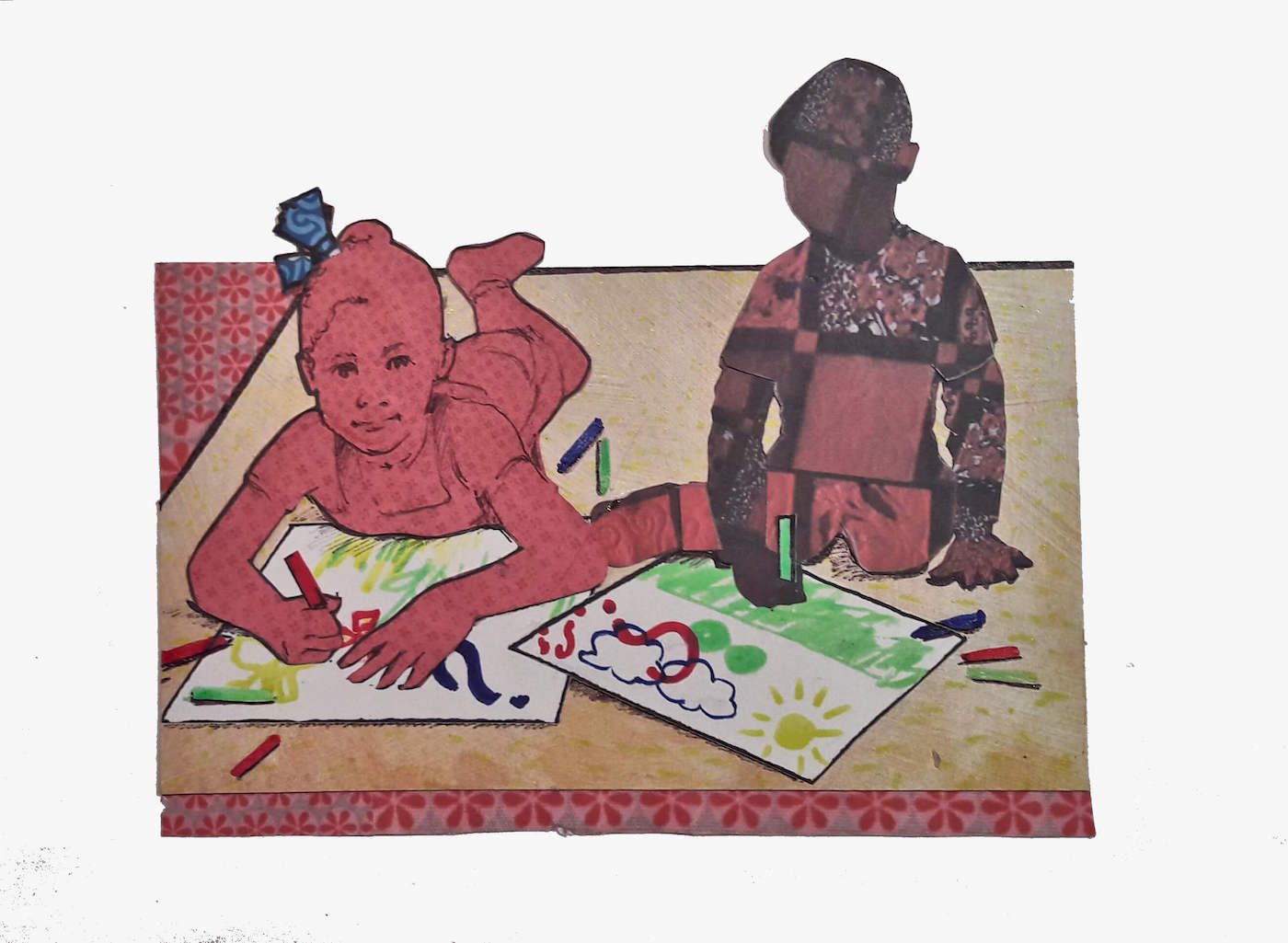
THURSDAY. Little Moses stretches on the classroom floor, finger-painting alongside his classmates. Although he is old enough to be in third grade, the teachers have him in first, as his English and math skills were far behind when he came to America.
The girl next to him, Alexis, draws a squiggly line and a dot on his paper.
“Do you know what that is?” she says.
Moses tilts his head.
“No,” he says.
“It’s a question mark.”
“What does it mean?”
“It means, if you have a question, you put it at the end. That’s what makes it a question. Like if I say, ‘Where are you going, Moses?’, I would put a question mark at the end.”
Moses smiles. He likes learning things. He rubs his fingers in blue paint and makes the same symbol on the girl’s page.
“Like that?”
“Yeah, but you have to ask a question.”
“OK. Ummm…Do you like bananas?”
“Yes.”
“Good. You can eat my bananas. I do not like them.”
They laugh and mash their hands together, smearing paint on each other’s sleeves.
“Children! Everyone wash up right now! Let’s go!”
The teachers are suddenly shuffling the kids to the sinks. Moses goes to grab his paper but the teacher lifts him away.
“We have to wash now, Little Moses!”
Minutes later, they are dressed in their coats and lined up in the hallway.
“Boys and girls,” the school principal announces, “we’re going to be closing school early. Your parents have been called and they are on their way to pick you up.”
Moses is standing in the back of the group. He reaches into his pockets for his gloves. He feels one, but the other pocket is empty. His mother will be angry if he loses a glove. He already lost one this year.
He slips from the group and heads back to his classroom. He passes the school offices, where he glimpses the cook, Miss Julianna, sitting by herself. He hears her coughing and coughing.
He taps the glass and waves at her through it.
She looks up, scared. Moses goes to open the door – he wants to ask if she can find his glove – but she waves a finger wildly and shakes her head no. She looks so serious. Moses lets go of the doorknob. He is confused. Normally, Miss Julianna is happy to see him. Sometimes, she gives him snacks.
She lifts her hands as if to say, “Sorry” then starts coughing wildly. Moses leans down and undoes his knapsack. He takes out a piece of paper and finds a crayon. He draws something. Then he holds the paper up to the glass so Miss Julianna can see it.
It’s a question mark.
THURSDAY NIGHT. Greg comes into his bedroom, where Aimee is watching the TV news.
“How long before they contain this?” she says.
Greg sits down on the bed. He rubs his forehead.
“They’re not gonna contain it,” he says.
“What do you mean?”
“Today at work, they told us to brace for a lot of cases. They’re ramping up supplies. They’re calling patients and giving them the option of cancelling appointments, or doing them over the phone. They don’t want any more people around than necessary.”
He pauses. “I’ve been reading up on it, Aimee. This is no ordinary flu. The contagion rate is too high. And the data on people dying from it – I don’t know. It looks like it attacks the lungs.”
Aimee is staring at him.
“That’s your field,” she says.
“Which means I’m on call every day.”
Aimee shifts in the bed. “This doesn’t make sense. I heard the President yesterday. He said it was nothing. He said it’s going to go away.”
“That’s just dumb.” Greg rises. “This kind of virus doesn’t ‘go away’.”
He heads to the bathroom. A minute later he returns. Aimee is punching her phone.
“What are you doing?”
“Calling my mother. I don’t trust that assisted living place. I want her here.”
FRIDAY. Pastor Winston and Lilly are sitting in the church pews.
“We have to tell people by today,” Lilly says.
“Only if we’re cancelling services.”
“Well? Are we cancelling services?”
“The news said you can’t have groups of 250.”
“And?”
“Lilly, if we had 250 people, I’d be thrilled.”
“But what if we have 100? We get that a lot. What if it’s dangerous?”
“We’re here to spread the word of God.”
“What if we spread something else?”
Pastor Winston rubs his chin. He looks around the empty sanctuary, which is quiet and clean, the walls recently repainted. Winston likes sitting here during the week. There is a serenity to it, and a welcoming feeling, as if the Lord is pleasantly surprised to see someone when it’s not Sunday.
“We can get another hand sanitizer station,” Winston says.
“There was no sanitizer at the supermarket. And all the toilet paper was gone.”
“Gone? Why?”
Lilly leans back. “People don’t need a reason when they’re scared, Winston.”
Suddenly, the rear door creaks open. Rosebaby steps inside, wearing a long brown coat and a bandana around her hair.
“Hello, Rosebaby,” Pastor Winston says, surprised to see her. “Is everything OK?”
She approaches the pew.
“What is it, Dear?” Lilly says.
Rosebaby lowers her eyes.
“I need to confess something, Pastor,” she says.
Winston rises. “All right. We can go to my office—‘’
“It is about Little Moses.”
“Is your son all right?” Lilly asks.
Rosebaby drops to her knees.
“He is not my son,” she says, her voice cracking. “I found him when he was a baby. He is different. And with this sickness going around, there is something you must know about him…”
End of Chapter One
Pay it Forward
If you're enjoying "Human Touch" so far, would you consider, if you're able, adding a human touch of your own by donating any amount to help my hometown city of Detroit? DETROIT BEATS COVID-19! initiative of SAY Detroit focused on first responders, seniors, poor children and the homeless. SAY Detroit’s whole-health approach to serving Detroiters in need continues today through its community health clinic and on-site pharmacy, which serves patients regardless of their ability to pay.
Thanks, as always,

Download as an e-book
Please consult your specific device’s manual for how to add one of these to your library.
The Story Continues …
Chapter Two
Read Now
Chapter Three
Read Now
Chapter Four
Read Now
Chapter Five
Read Now
Chapter Six
Read Now
Chapter Seven
Read Now
Chapter Eight
Read Now
About the Series
Recent Books
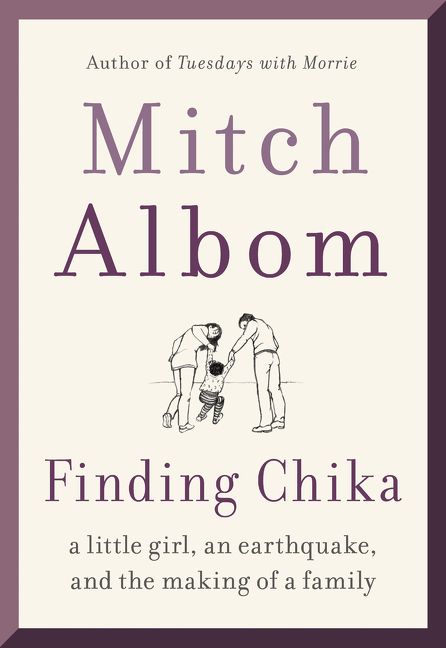
Finding Chika is a celebration of a girl, her guardians, and the incredible bond they formed—a devastatingly beautiful portrait of what it means to be a family, regardless of how it is made.
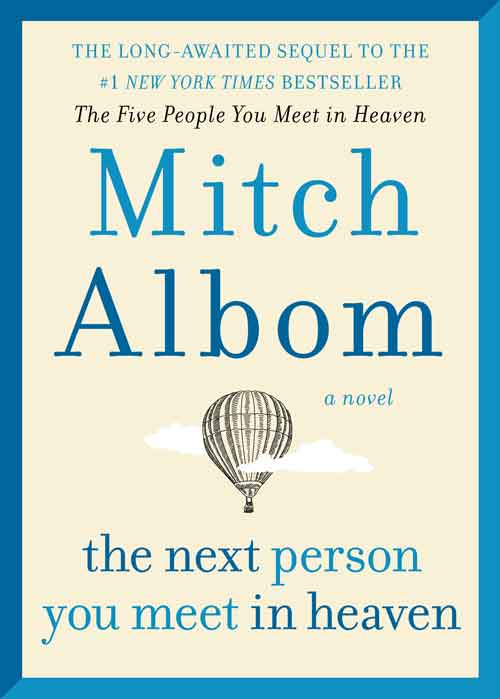
A sequel to the bestseller The Five People You Meet in Heaven, Eddie’s heavenly reunion with Annie — the little girl he saved on earth — is an unforgettable novel of how our lives and losses intersect.
There's always more to read with Shelved...
Sign up for Mitch's free newsletter. Non-spammy. When there’s something great to share, we’ll send special updates your way. Exclusive items like excerpts from a new book, signed book giveaways, event alerts, and more. Still need more? Get familiar with Shelved here.

